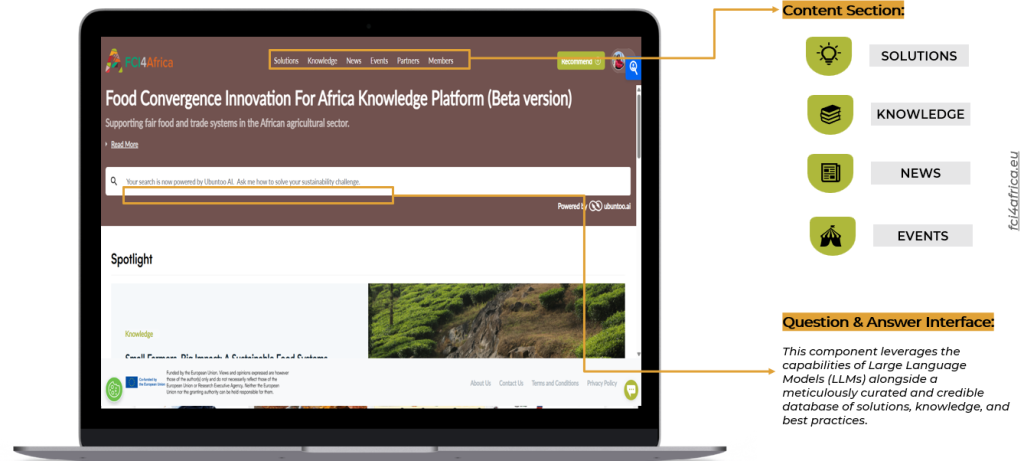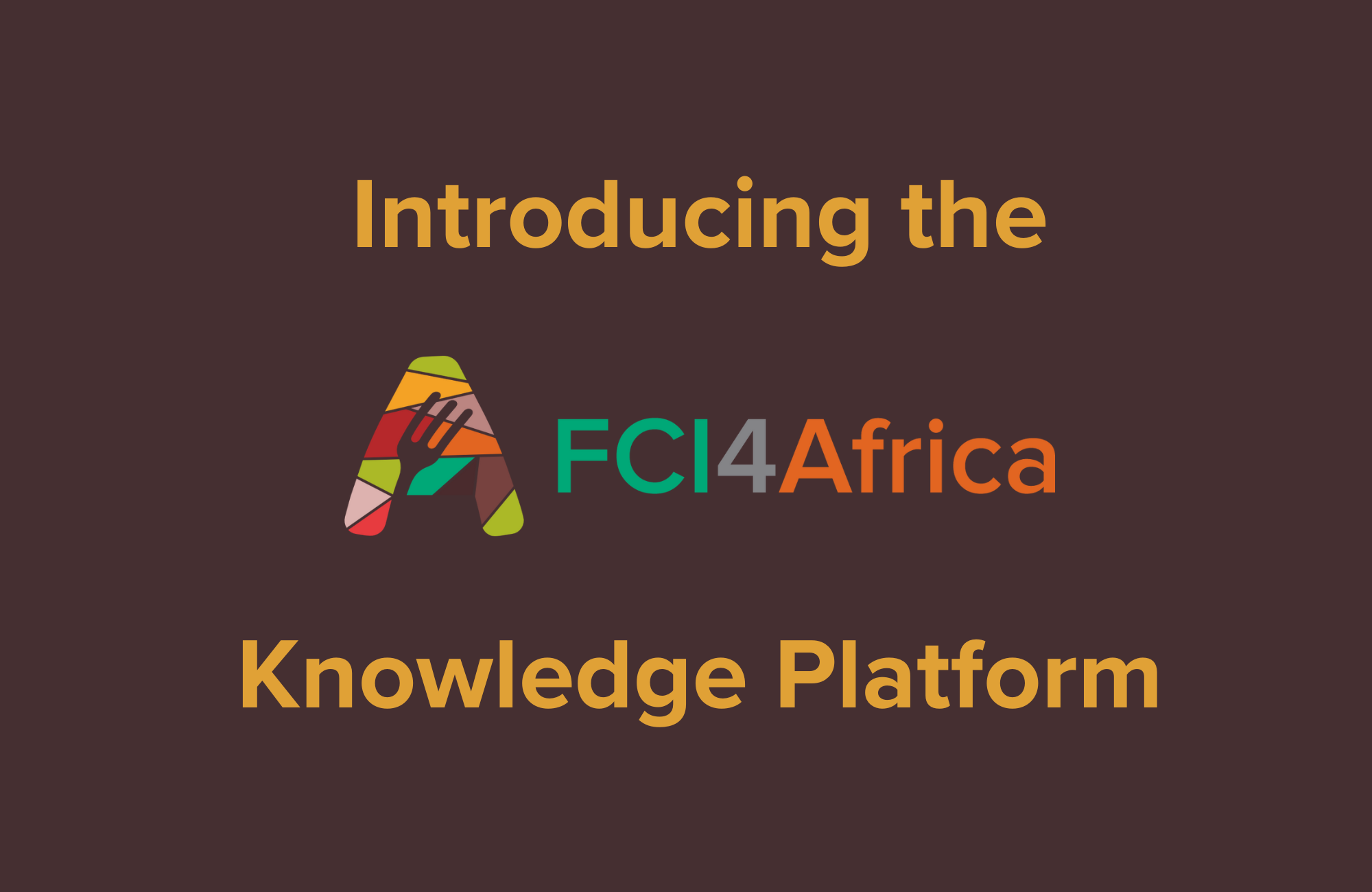The FCI4Africa Knowledge Platform is conceived as the project’s digital knowledge hub, where ground evidence, expertise, and practices converge. The hub is designed to give every partner, including researchers, policy specialists, businesses, and field teams, reliable access to the insights they need to build climate-smart, just, fair, and sustainable food systems.
Within the project, the platform fulfils two practical functions. First, it houses a curated, AI-enabled knowledge collection derived from more than one billion data points spanning academic research, industry guidance, policy texts, and trade statistics. Second, it captures evidence generated under the project itself, such as field-trial results, interview transcripts, and project outputs, and makes those materials immediately available to diverse stakeholders, including the technology and innovation sector, academic and research organisations, policymakers and regulators, and other food system stakeholders. Additional content shall also be sourced from curated and verified repositories such as FS4Africa, FAO databases, and consortium partner platforms.
The platform is equipped with Ubuntoo AI, a Q&A interface that harnesses the capabilities of Large Language Models (LLMs) in conjunction with the meticulously curated and credible Hub of environmental solutions and knowledge. The users can use this simple interface to interact with the content added to the Hub, asking questions and getting a summarised, AI-generated response within seconds.
Beyond the grant period, the Knowledge Platform is planned to evolve into a dynamic digital ecosystem that fosters ongoing collaboration among African and European food system actors. Conceived as a scalable public good, it will provide open access to verified data and carefully curated insights, empowering future research, regulatory alignment, and business innovation. Its open architecture invites complementary initiatives such as INCiTiS-FOOD and FoodSafety4Africa to plug into and expand the knowledge base, while planned links with Digital Innovation Hubs, national platforms, and policy-making networks across Africa and the EU will embed the platform in a broader and continuous knowledge exchange.
The Knowledge Platform organises the content into four interlinked categories, i.e, Solutions, Knowledge, News and Events, so that users can locate the exact resource they need without wading through unrelated content.

- Solutions profiles are market-ready offerings that advance sustainable, fair, and climate-resilient food systems, such as startups and established companies with relevant technologies or services, verified techno-commercial innovations, and early stage academic pilots with scale-up potential.
- The Knowledge section serves as the backbone, drawing together peer-reviewed papers, best practices, practical “how-to” guides, detailed research protocols, comprehensive institutional reports, legislative texts, industry market analyses, conference proceedings, recognised international and national standards, survey findings, and curated podcasts or documentaries.
- News delivers concise, real-time updates on regulatory developments, certification schemes, market movements, and notable innovations, while also carrying announcements from the consortium and the platform itself.
- Events connect users to learning and networking opportunities at local, regional, and global levels, listing upcoming conferences, symposiums, expos, webinars, exhibitions, workshops, training sessions, and open calls for participation or funding.
The content curation methodology combines AI-driven curation with human oversight, following both top-down (expert-informed, project-aligned) and bottom-up (community- and use-case-driven) approaches. The top-down approach uses contextual AI to mine more than one billion data points, such as academic papers, patents, grey literature, and regulatory briefs, and cluster them by thematic relevance. In parallel, a bottom-up approach shall gather ground evidence and insights generated under the project. Curators examine both streams, selecting items that align with project priorities before they reach the hub. Through iterative filtering, network cleaning, and expert validation, only the most relevant insights are transformed into platform-ready knowledge assets. This process ensures each piece of content meets FCI4Africa’s standards for precision, usability, and stakeholder relevance before being published and made discoverable through the platform’s Q&A interface.
To ensure that the FCI4Africa Knowledge Platform remains dynamic, Ubuntoo implements a structured process for integrating real-time field learnings and stakeholder insights. Monthly coordination calls with Work Package (WP) leads will serve as the primary mechanism for gathering updates on emerging data, ongoing analyses, and reviewing secondary literature across the consortium. These calls provide a regular pulse on project progress, surfacing new findings, priority themes, and areas where additional knowledge support may be required. As part of this process:
- Secondary literature referenced or identified during WP activities will be reviewed and, where relevant, added to the platform on a quarterly basis.
- Project-generated insights and outputs, such as methodologies, case studies, toolkits, or technical findings, will be incorporated once they are finalised, approved by the EU, and published as official deliverables on the project website.
- The platform also maintains a traceable content tagging system, indicating whether resources are from peer-reviewed literature, project-generated deliverables, or field contributed insights. This will offer users clear context on the origin and validation status of each knowledge piece. Through this method, the platform will ensure it remains both an evolving repository and a trusted source of validated information.
The Knowledge Platform applies a layered quality assurance model that couples automated screening with rigorous human review. Contextual AI first scans large literature and data sets to identify relevant material, but every prospective entry then passes to human specialists for line-by-line verification and alignment with the platform’s taxonomy. Content must satisfy five publication filters, i.e, relevance to project themes, verifiable provenance, stakeholder utility, clear presentation, and demonstrable added value, before it is approved. Weekly audits check for duplication and factual accuracy, while real-time validations address emerging issues. All records carry structured metadata on source, geography, and stakeholder focus, plus disclaimers where data limitations exist. Continuous feedback loops through monthly project calls, quarterly stakeholder surveys, and open comment threads allow users to flag outdated information and request new topics, ensuring that the repository remains accurate, current, and responsive to evolving needs.
As the FCI4Africa project transitions from design/planning to implementation, the Knowledge Platform is poised to translate information into collective progress. Its open architecture, rigorous curation model, and real-time feedback loops create more than a digital library. The platform will serve as a working space where evidence becomes policy guidance, pilot data informs investment rationale, and local experience translates into regional practice. We invite researchers, innovators, public agencies, and private enterprises alike to engage with the hub, contribute new insights, and draw on its growing resource base. By doing so, each stakeholder strengthens a shared foundation for food systems that are fair, climate-resilient, and economically rewarding, extending well beyond the project’s lifespan.
*The article and screenshot of the Knowledge Platform are courtesy of Ubuntoo.



